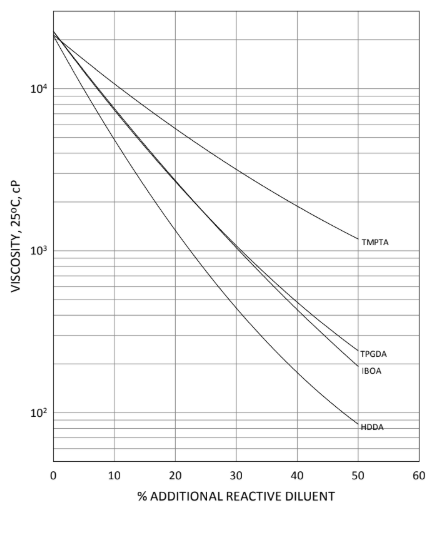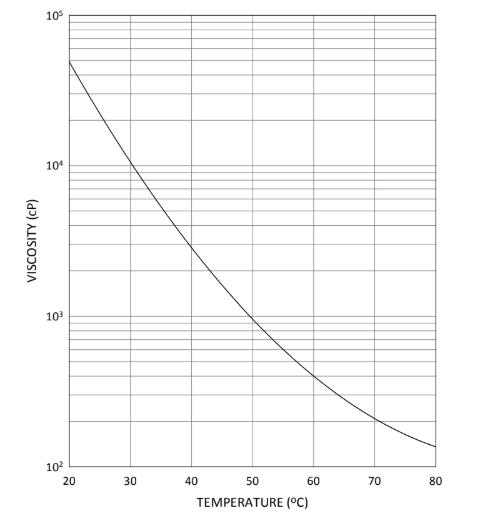Enhanced TDS
Identification & Functionality
- Blend
- No
- CASE Ingredients Functions
- Chemical Family
- Function
- Monomer
- Product Code
- MITM10091
- Single Ingredient
- Yes
- Technologies
- Product Families
Features & Benefits
- CASE Ingredients Features
- Product Benefits
- Light color
- Fast cure response
- Good wetting of pigments, matting agents, and substrates
Applications & Uses
- Application Method
- Coating End Applications
- Compatible Substrates & Surfaces
- Cure Method
- Markets
- Applications
- Product Applications
- Coatings for paper, rigid plastics (i.e. polycarbonate), metal
- Wood fillers and sealers
- Pigmented coatings
- Low gloss overprint varnishes
Properties
- Physical Form
- Product Properties
- High surface hardness
- High gloss
- Good chemical resistance
- Water resistance
Technical Details & Test Data
- Technical Data
EBECRYL® 3730-TP25 - Viscosity Reduction With Reactive Diluents

Graph I shows the viscosity reduction of ebecryl 3730-tp25 with 1,6-hexanediol diacrylate (hdda), isobornyl acrylate (iboa), trimethylolpropane triacrylate (tmpta), and tripropylene glycol diacrylate (tpgda). Although viscosity reduction can be achieved with non-reactive solvents, reactive diluents are preferred because they are essentially 100 percent converted during uv/eb exposure to form a part of the coating or ink, thus reducing solvent emissions. The specific reactive diluents used will influence performance properties such as hardness and flexibility.
EBECRYL® 3730-TP25 - Viscosity vs. Temperature

Packaging & Availability
- Packaging Type
Principal Information
- Group Principal Number
- S000001
- Principal
Storage & Handling
- Storage Conditions
- Care should be taken not to expose the product to high temperature conditions, direct sunlight, ignition sources, oxidizing agents, alkalis or acids.
- This might cause uncontrollable polymerization of the product with the generation of heat.
- Storage and handling should be in stainless steel, amber glass, amber polyethylene or baked phenolic lined containers.
- Procedures that remove or displace oxygen from the material should be avoided.
- Do not store this material under an oxygen free atmosphere.
- Dry air is recommended to displace material removed from the container.
- Wash thoroughly after handling.
- Keep container tightly closed.
- Use with adequate ventilation.
Other
- Appearance
- Clear liquid
- Appearance (SDS)
- Liquid
- Color (SDS)
- Clear to light amber
- IATA/ICAO Proper Shipping Name
- Environmentally hazardous substance, liquid, N.O.S.
- IATA/ICAO Technical name (N.O.S.)
- Tripropylene glycol diacrylate
- IATA/ICAO UN Number
- UN3082
- IMO/IMDG Proper Shipping Name
- Environmentally hazardous substance, liquid, N.O.S.
- IMO/IMDG Technical name (N.O.S.)
- Tripropylene glycol diacrylate
- IMO/IMDG UN Number
- UN3082
- Insoluble in (SDS)
- Water
- Item Number
- Odor (SDS)
- Acrylate
- Other Hazards
- Polymerization may occur from excessive heat, contamination or exposure to direct sunlight .
- Protect from Freezing
- Yes
- TDG Canada Proper Shipping Name
- Environmentally hazardous substance, liquid, N.O.S.
- TDG Canada Technical name (N.O.S.)
- Tripropylene glycol diacrylate
- TDG Canada UN Number
- UN3082
- Temperature Control
- Yes
- USA/DOT Proper Shipping Name
- Environmentally hazardous substance, liquid, N.O.S.
- USA/DOT Technical name (N.O.S.)
- Tripropylene glycol diacrylate
- USA/DOT UN Number
- UN3082
- Chemical Properties
Value Units Test Method / Conditions Acid Value max. 3.0 mg KOH/g mg KOH/g Epoxy Group Content max. 0.5 % % - Material Composition
Value Units Test Method / Conditions Oligomer Content 75.0 - - Mechanical Properties
Value Units Test Method / Conditions Elongation 3.1 - at break, UV cured 125 μ thick films Tensile Modulus 455250.0 psi psi at break, UV cured 125 μ thick films Tensile Strength 9738.0 psi psi at break, UV cured 125 μ thick films - Optical Properties
Value Units Test Method / Conditions Color Scale max. 3.0 Gardner Gardner Gardner Color Scale - Physical Properties
Value Units Test Method / Conditions Density 1.15 g/mL g/mL At 25°C Storage Temperature 40.0-104.0 °F °F Viscosity 13000.0-20000.0 - At 25°C - SDS Physical and Chemical Properties
Value Units Test Method / Conditions Boiling Point (SDS) min. 100.0 °C °C Density (SDS) 1.14 g/cm³ g/cm³ Flash Point (SDS) min. 100.0 °C °C SetaFlash Closed Cup Vapor Pressure (SDS) max. 0.13 - at 20°C Viscosity (SDS) 17500.0-27500.0 cPs cPs at 25°C - Shelf Life & Stability
Value Units Test Method / Conditions Shelf Life 0.0 -
